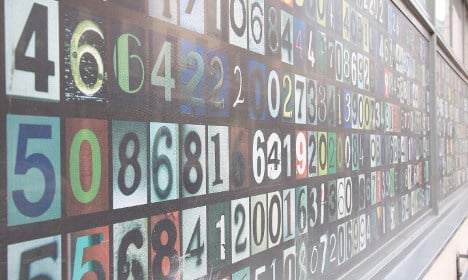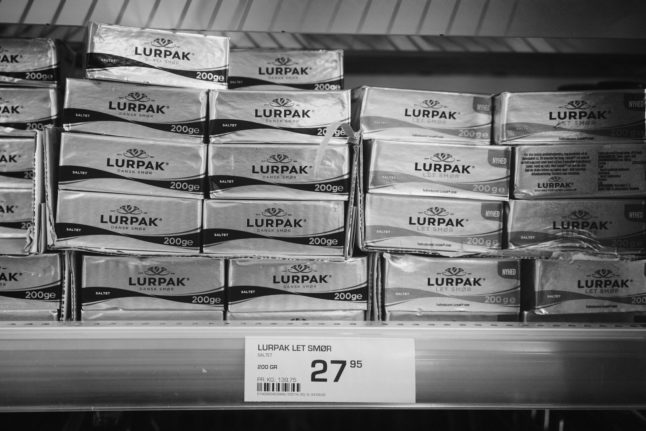As brilliantly described in this article, the Danish numbering system for the multiples of ten from 50 to 90 is brain-bendingly perverse.
Starting with the word for fifty, halvtreds.
It is constructed of halvtredje, meaning “two and a half”, and sindstyve, meaning “times 20”, so 2½ times 20 equals 50.
And from there it only gets worse.
- 60, tres, is the more simple tre (three) and sindstyve: 3 times 20 equals 60.
- 70, halvfjerds, is constructed of halvfjerde and sindstyve: 3½ times 20 equals 70.
- 80, firs, is the more simple fire (four) and sindstyve: 4 times 20 equals 80.
- 90, halvfems, is constructed of halvfemte and sindstyve: 4½ times 20 equals 90.
Leaving aside the fact that the suffix halv means something different in each of the three times that it is used, why on earth do the Danes suddenly switch from multiplying by ten to multiplying by 20?
The answer is that they didn’t use to.
According to the famed Danish language researcher Johannes Brøndum-Nielsen, up until about 1300, Danish used the forms siutyugh, “six tens” for 60, following the same system right up to 100.
So what happened?
No one knows for sure, but the earliest use of multiples of 20 found in a Danish text is in the municipal law for the city of Flensborg, from about 1300, which included the forms fiyrsin tiughæ (4 x 20) and half fæmpt sin tiygh (4½ times 20 equals 90).
Flensborg is now in Germany, but was then at that point in very south of Jutland. By 1400, the use of these strange forms had spread as far east as Lund in Skåne, then also part of Denmark.
“It can be stated with a considerable degree of certainty that the process of adopting the vigesimal system began in Western Denmark and spread eastwards,” concludes Błażej Garczyński, a PHD student at Adam Mickiewicz University, in a research paper on Danish numbers.
He also points out that the numbers from 50 to 100 are generally more prone to developing varied forms, as they are used much less frequently than 10-50.
The question is where the early medieval burghers of Flensborg got the strange idea of multiplying 20s by unusual fractions?
As anyone who has learned French — with its quatre-vingt (80) and quatre-vingt-dix (90) — will know, Danish is not alone in having twenty-based counting.
Such numeral forms are described as “vigesimal”, and according to the Swedish language historian Stig Eliasson, the consensus is that the forerunners of Indo-European languages such as Danish did not use them.
“Proto Indo-European is considered to have been thoroughly decimal,” he explains in his comparison of vigesimal counting in Old Danish and Basque.
“Nevertheless,” he continues, “twenty-based counting shows up in quite a few of its daughter languages, the best known western case being perhaps that of Old French. In the Celtic languages, vigesimal counting is found in the Gaelic – Modern Irish, Scottish Gaelic, and Manx – as well as the Brittonic branch – Welsh, Cornish, and Breton.”
The form is also common in Basque, the Northern version of which uses a vigesimal system all the way from 20 to 180.
As Celtic languages are also Indo-European, some researchers have argued that Basque is the only European language in which the vigesimal system is original.
Eliasson told The Local that it was possible, however, that the system originated in languages spoken among the people in northwest Europe before the Celts arrived, of which Basque is the only survivor, and that those languages then influenced Celtic languages, such as Gaulic, which then in turn influenced Old French, Gaelic, and perhaps even Danish.
“It is conceivable that Basque might somehow have been part of a kind of Pre-Celtic numerical Sprachbund [linguistic area] that might have been at the roots of West European vigesimal counting. But we know nothing about such a Sprachbund if it actually existed,” he said.
Some argue that rather than the French inheriting their vigesimal habits from the Gauls, the Normans picked them up from the Celts.
None of this, however, explains the sheer weirdness of the Danish practice of multiplying 20 by 2½, 3½ and 4½. Most vigesimal languages, taking the same pattern as the French quatre-vingt-dix, just add a ten to the closest multiple of 20.
“There are no obvious details that link these two numeral systems in such a way as to suggest direct linguistic (semantic) copying from Basque to Danish,” Eliasson told The Local.
But this does not mean that the Danish system was not influenced by other vigesimal counting systems.
“I believe that there may be a connection between the various vigesimal systems in Western Europe and that an important role has been played by cultural contact, at least in the Danish case,” he said.
“Vigesimal counting may have been practiced in trade and hence triggered the development of the Danish vigesimal numerals.The vigesimal numerals in Danish might have been created in response to vigesimal counting practices in contact with speakers of languages with vigesimal numerals structured perhaps in partly different ways than what was to be the case in Danish.”
Most researchers have concluded, however, in Eliasson’s words, that rather than having “pre-medieval roots or a trigger in language-contact”, Denmark’s numbers are “a spontaneous language-internal innovation in the Middle Ages”.
In other words, you can blame the Jutlanders.



 Please whitelist us to continue reading.
Please whitelist us to continue reading.
Member comments